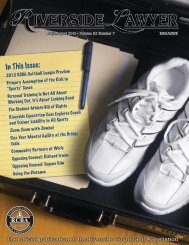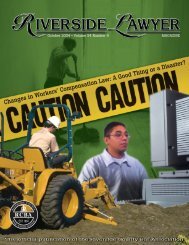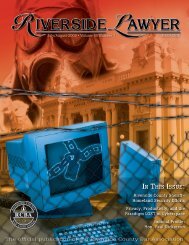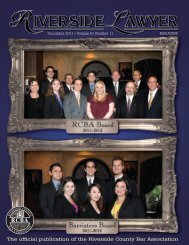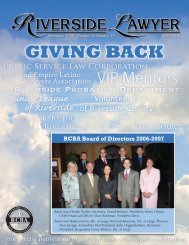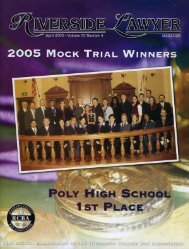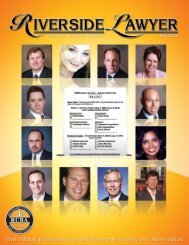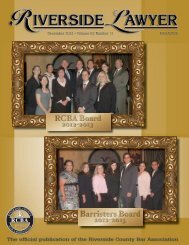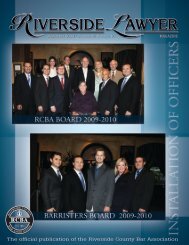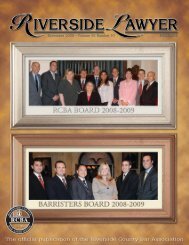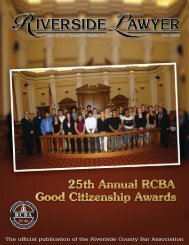In This Issue: - Riverside County Bar Association
In This Issue: - Riverside County Bar Association
In This Issue: - Riverside County Bar Association
Create successful ePaper yourself
Turn your PDF publications into a flip-book with our unique Google optimized e-Paper software.
LGBT Couples Highlight <strong>Issue</strong>s of a Gr ow i n g<br />
Elderly Demographic<br />
by Christopher J. Buechler<br />
Lesbian, gay, bisexual, and transgender individuals and<br />
couples have made great strides in achieving civil equality<br />
since the emergence of the modern gay-rights movement from<br />
Stonewall in New York in 1969. I have had the pleasure of<br />
reporting on legal victories leading to the repeal of Don’t Ask,<br />
Don’t Tell and major blows to California’s Proposition 8, as<br />
well as the federal Defense of Marriage Act. I am fortunate to be<br />
of the generation where adult adoption of a same-sex partner<br />
as a work-around to estate planning issues is history and not<br />
reality. And I must admit that my life as an out and partnered<br />
gay man is quite easy living in the wake of those pioneering<br />
trailblazers who have gone before me. But those trailblazers<br />
are at least two generations removed from my partner and<br />
me, a typical married couple residing in the bedroom community<br />
of <strong>Riverside</strong>. Most of them were quite content to reject<br />
traditional family structures if their families rejected them for<br />
who they were and their civil rights were rejected in the name<br />
of “family values.” They built communities and formed their<br />
own “families” in urban enclaves like San Francisco’s Castro<br />
District, L.A.’s West Hollywood, and even a large swath of our<br />
very own Palm Springs.<br />
As LGBT civil rights progressed, and homophobia was<br />
replaced with familiarity and tolerance, LGBT individuals took<br />
on more traditional family roles as sons and daughters, aunts<br />
and uncles, and – increasingly – mothers and fathers. With<br />
these traditional family roles came the benefits of traditional<br />
family support. But what of that lost generation of the aforementioned<br />
trailblazers? For a movement that started 43 years<br />
ago, surely some of them must be less concerned with LGBT<br />
civil rights and more concerned with elder rights. Some of<br />
them are dealing with the hard intersection of LGBT and elder<br />
rights issues as their “family” advocates are not given the same<br />
legal status as a traditional family advocate, like a spouse or<br />
child, to carry out end-of-life planning and estate distribution.<br />
Gary Gates, a scholar and demographer at UCLA Law School’s<br />
Williams <strong>In</strong>stitute, has studied U.S. Census data going back<br />
to 1990 (when same-sex parenting couples were first identified),<br />
and found that the percentage of same-sex unmarried<br />
partner couples with children under the age of 18 in the<br />
home has increased from 12.5% in 1990 to a peak of 18.8%<br />
in 2006, down to 16.2% in 2009. 1 But that means that 83.8%<br />
of unmarried same-sex couples do not have children. They<br />
have been referred to flippantly as DINKs (Double <strong>In</strong>come, No<br />
Kids), 2 but with the economic downturn and a more sophisticated<br />
understanding of LGBT demographics, the joke is not<br />
1 williamsinstitute.law.ucla.edu/wp-content/uploads/Gates-Badgett-<br />
NCFR-LGBT-Families-December-2011.pdf.<br />
2 Also TINKs (Two <strong>In</strong>comes, No Kids).<br />
as funny; some of them may be OINKs (One <strong>In</strong>come), LINKs<br />
(Low <strong>In</strong>come) or NINKs (No <strong>In</strong>come). Some of that may be by<br />
choice or circumstance, but some of that is by policy design<br />
(i.e., North Carolina’s recently passed Amendment 1 and other<br />
anti-marriage equality and anti-adoption equality laws).<br />
You may think that passing marriage and adoption equality<br />
measures would be an easy fix to this problem. But that fix<br />
applies mostly prospectively for select LGBT couples, and it<br />
doesn’t address the issues highlighted above that affect their<br />
similarly situated heterosexual counterparts: childless couples,<br />
people estranged from their traditional family, and unmarried<br />
cohabitating couples. <strong>In</strong> her book, Beyond (Straight and Gay)<br />
Marriage: Valuing All Families under the Law (Beacon Press,<br />
2008), Law Professor Nancy Polikoff lays out the argument that<br />
structuring social rights and benefits around marriage ignores<br />
the reality of an increasing number of couples and individuals<br />
who structure their lives around, “diverse kinds of partnerships,<br />
households, kinship relationships and families.” 3<br />
Even a legislative fix is only half the battle for these families.<br />
Consider the 2010 case of Clay M. Greene and Harold Scull,<br />
a same-sex couple from Sonoma <strong>County</strong>, CA. 4 When Mr. Scull,<br />
89, suffered a fall down the stairs in April 2008, the county<br />
petitioned the court for conservatorship and then proceeded<br />
to dispose of nearly $500,000 worth of belongings accumulated<br />
by the couple over the years. It characterized Mr. Greene, 78,<br />
as the “roommate,” despite documentation they had prepared<br />
in case of the death or incapacitation of either party and the<br />
reality of their relationship. It then moved the understandably<br />
antagonistic Mr. Greene into a nursing home against his will.<br />
On top of the loss of property and dignity, Clay Greene also lost<br />
his longtime partner in August 2008.<br />
Fortunately, Mr. Greene was able to recover a substantial<br />
sum of money, as well as to force a change in policy at the<br />
Sonoma <strong>County</strong> Public Guardian’s office. But this case just<br />
highlights the need for our laws and the people charged with<br />
enforcing them to treat all elderly couples and individuals, gay<br />
and straight, with respect and dignity, regardless of how they<br />
choose (or are forced) to structure their family.<br />
Christopher J. Buechler lives in <strong>Riverside</strong> with his registered<br />
domestic partner, William Marin, a Human Resources<br />
Analyst for the <strong>County</strong> of <strong>Riverside</strong>.<br />
3 “Beyond Same-Sex Marriage: A New Strategic Vision for all our<br />
Families & Relationships,” available at beyondmarriage.org/<br />
full_statement.html.<br />
4 nclrights.org/site/PageServer?pagename=issue_caseDocket_<br />
Greene_v_<strong>County</strong>_of_Sonoma_et_al.<br />
22 <strong>Riverside</strong> Lawyer, June 2012



